7 Best Reverse Username Search Sites [2024]
by Ryan Hart | Updated on March 2, 2024 | Post may contain affiliate links. As an Amazon Associate we earn from qualifying purchases.
Have you ever been curious about a person you were talking to online? Reverse username search sites can provide you with more information, but not all sites are reliable.
Some reverse username search sites are difficult to use, while others cannot find recent or accurate information.
If you’re looking for a username finder that’s actually effective, these seven sites can dig up the kind of information that you want to find.
Some say there’s not much in a name, but these social media username search tools prove that one name can tell you a lot.

How to find someone by social media username?
If you have someone’s online username and you want to learn more about them, reverse username search sites can tell you what you want to know. These sites scan other social media networks, forums, and other platforms to find real information about the people you’re talking to online.
The right site will help you find pictures, other online accounts, and more. If you have a username and use the right site, you should be able to find out everything you want to know.
1. Social Catfish
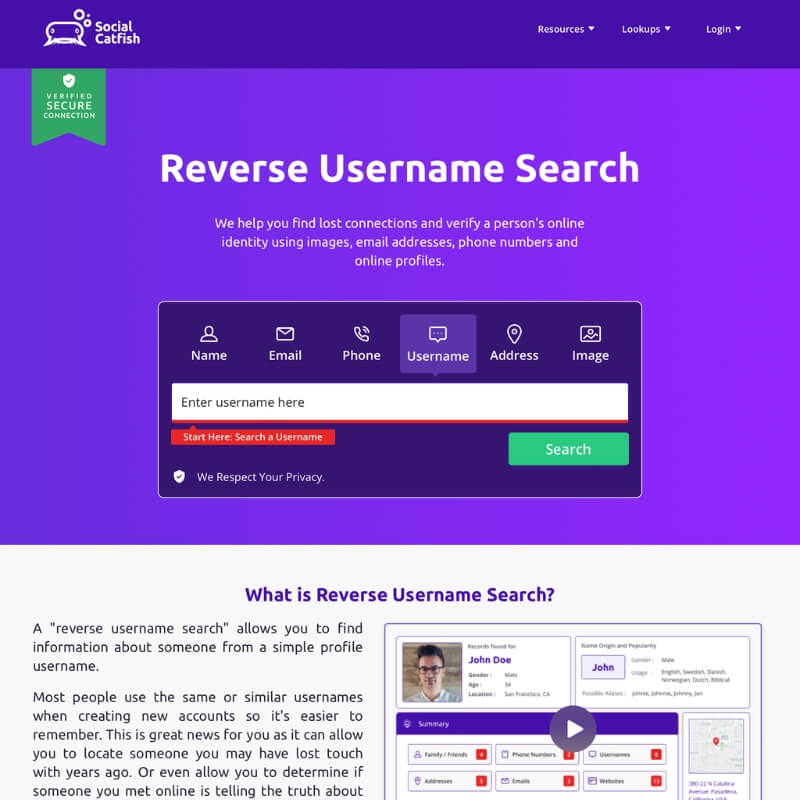
Based in California, Social Catfish is a service designed to help users avoid online fraud and romance scams. While the site began as a blog that warned users about catfishing, it’s since evolved into an investigative platform.
Using proprietary tools, the site verifies information, such as phone numbers, images, and social email accounts. If someone is lying about their identity, Social Catfish can catch them in the act. In addition, the site works with the Responsible Data Alliance to protect its users' private information.
What Social Catfish does best:
Social Catfish gives you multiple search options, allowing you to combine a username with other information you might have, such as a phone number or an image file. It’s a great way to protect yourself from scammers, especially when you’re using dating apps. This site can be a great resource to avoid scammers while dating online.
2. Spokeo

Spokeo is an online search tool created by Stanford University graduates. It uses both offline and online resources to gather detailed information about the people users search for. Not only can it provide basic information, like names and addresses, but it can also provide information on income, the names of spouses, and more.
One of the reasons that Spokeo is so effective is that it takes advantage of deep-web crawlers. It uses thousands of sources and completes more than 500,000 searches every day.
What Spokeo does best:
What makes Spokeo’s username finder particularly remarkable is that you can request future updates on your searches. Even if a report gives you little information at first, you could learn more later on. It’s a handy tool, especially if you want to keep tabs on a specific person.
3. BeenVerified
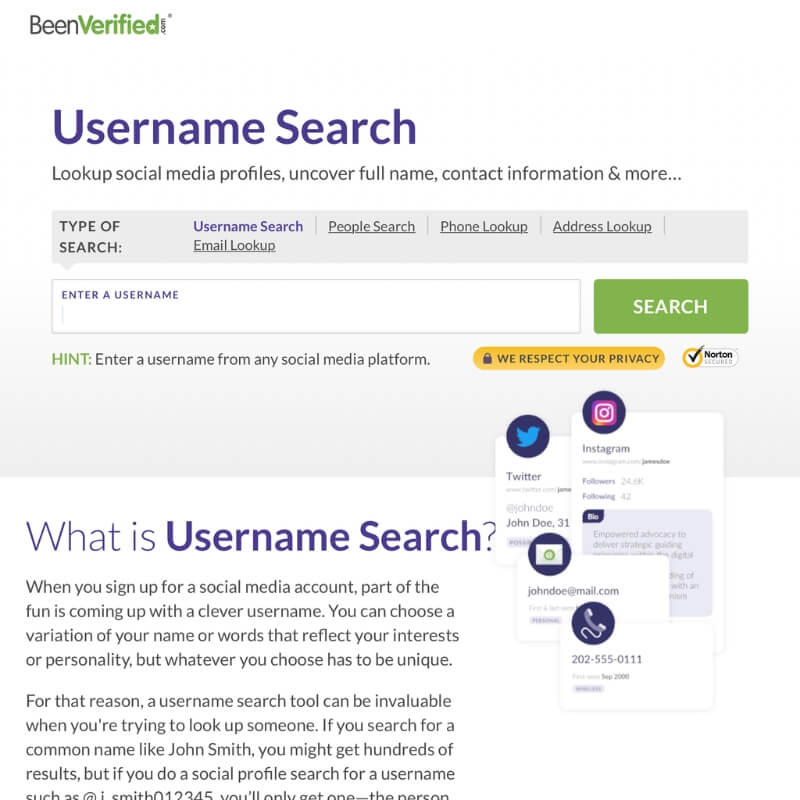
BeenVerified uses traditional background check methods, but it also takes advantage of Web 2.0 and social media. This allows the site to provide in-depth information about the people that users are searching for. It has millions of users and has even been featured on MTV’s Catfish.
While BeenVerified’s services aren’t free, they offer a wide range of affordable options, including trial memberships starting at just $1. In addition to username searches, it allows users to look up information on license plate numbers, names, and more.
What Been Verified does best:
When you use BeenVerified’s Reverse Username Search tool, you can select the information that you’re most interested in finding. It’s a convenient way to look into people you’re concerned about, but it’s also an excellent way to see what others could find out about you. If you find your information on BeenVerified, the site will remove it on request.
4. PeopleLooker
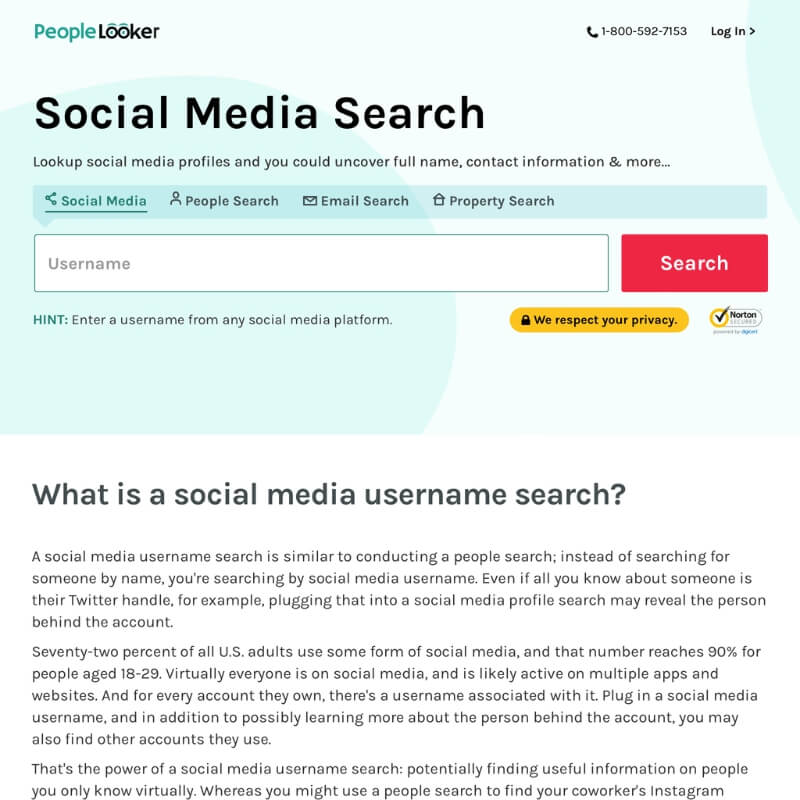
PeopleLooker is a comprehensive search tool that can provide users with detailed background reports on the people they search for. It can pull up criminal records, social media accounts, possible relatives, and more. It also allows you to search for unclaimed property and look for potential business contacts!
PeopleLooker is designed to be easy to use and deliver fast results. While you need a membership to use this service, you can test things out with a trial before committing.
What PeopleLooker does best:
With PeopleLooker’s social media username search tool, you can gather information on someone based on their online presence. The more active someone is online, the more effective the tool is. If you’re looking up someone that spends a lot of time on social media, you can’t go wrong with PeopleLooker.
5. Infotracer
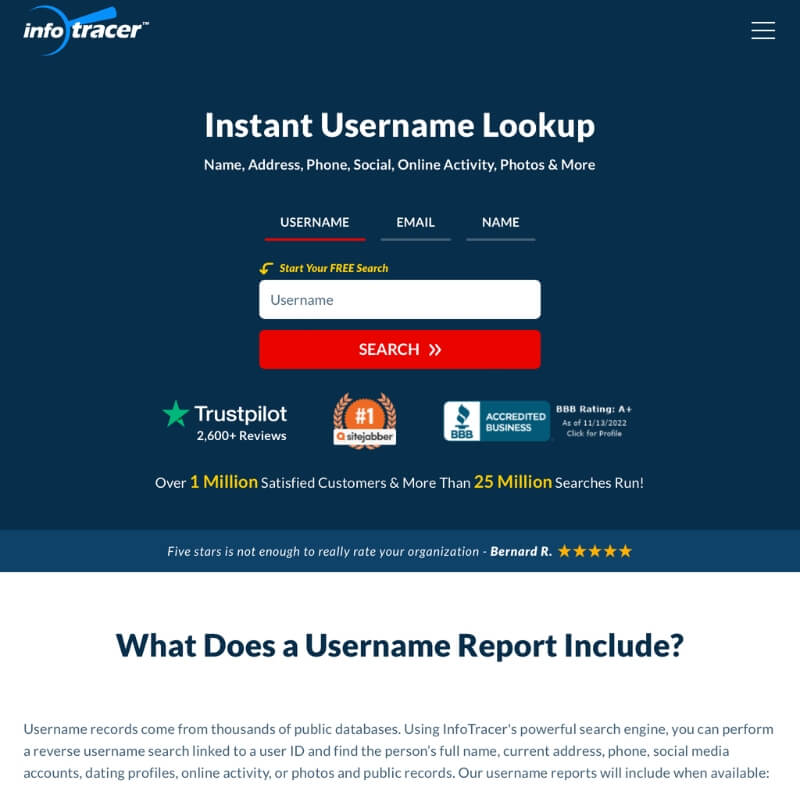
InfoTracer is an innovative search engine that scans thousands of databases for information. It’s capable of tracking down information many other search tools won’t bring up, such as mentions on forums and registrations or memberships on unlisted websites.
While InfoTracer offers subscriptions, users can also complete a limited number of free searches daily. Currently, the site has provided its users with access to more than 5 billion records, and more information is constantly being added.
What Info Tracer does best:
What’s great about InfoTracer is that its username lookup tool can also discover other online accounts used by the username owner. The site is a fantastic resource if you’re gathering as much information as possible. It’s effective when used alone or alongside other reverse username search sites.
6. IDCrawl
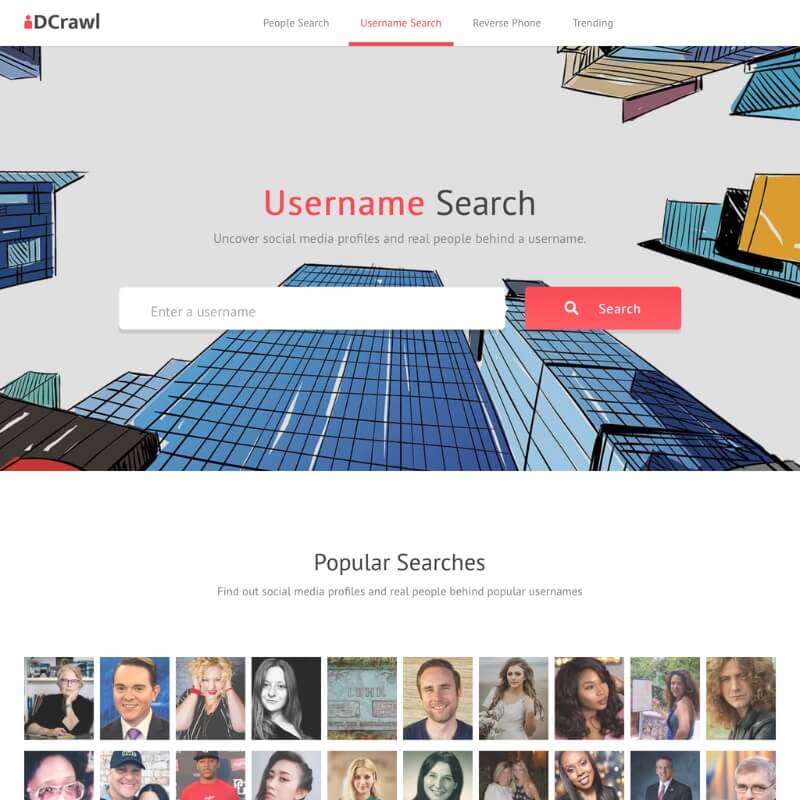
Imagine a version of Google that only provided information about people. That’s what IDCrawl does. This free search engine uses social media accounts, the deep web, and other resources to help you learn more about the people you’re searching for.
This information can be difficult to track down, but IDCrawl organizes data and makes it easy to find what you’re looking for. It also lets you see recent searches as well as the most popular searches on the site.
What IDCrawl does best:
Since IDCrawl lets you see who other people are searching for, it makes it easy to identify scammers. You can also use the free search tool to find out where a username is already taken online. It’s a quick way to see if your favorite username is still available on popular sites.
7. UserSearch
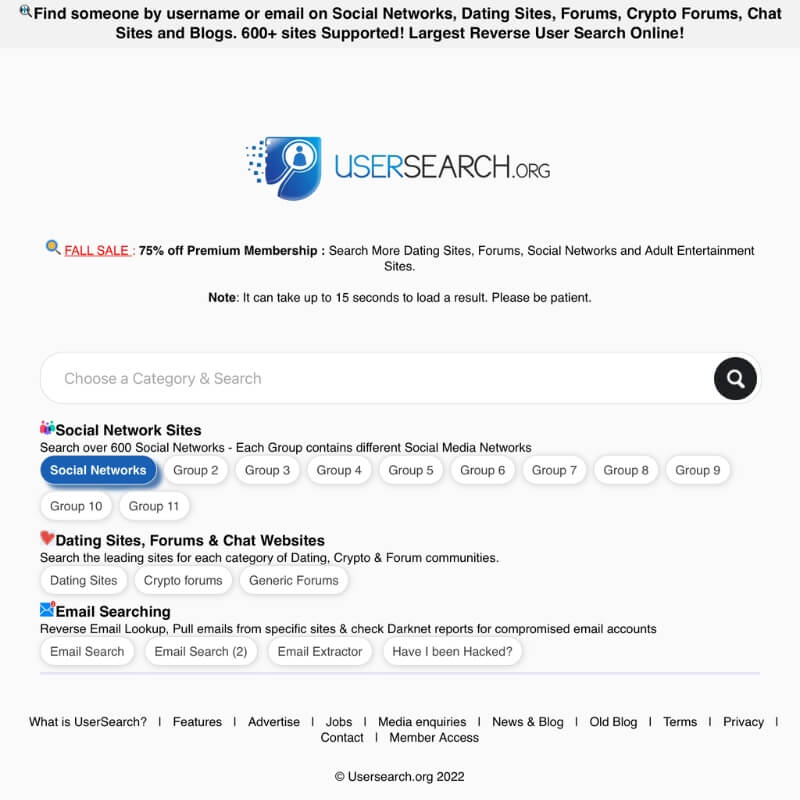
UserSearch is a powerful search engine that scans hundreds of sites and databases for information. It claims to be the largest reverse username search tool on the internet. While it is a membership-based search, you can run a limited number of searches for free.
The tool scans forums, chat websites, dating sites, and more than 600 social media platforms to find information. If someone has been using the same username on multiple sites, it’s safe to assume that you’ll be able to find them here.
What User Search does best:
UserSearch is an excellent option if you want to search for people on lesser-known websites, like cryptocurrency forums or adult entertainment sites. Since it scans so many sites, it can bring up information that other search-by-username tools won’t find. If you want to check as many sites as possible, UserSearch casts an extremely wide net.
Frequently Asked Questions
What is a Reverse Username Search Engine?
A reverse social media username search engine is a tool that allows you to find the actual name of someone on social media.
People use these sites because some scammers and spammers create fake accounts to trick people into giving them money or personal information. If you can find out who they are, then you can avoid being fooled by them.
These websites also allow you to search for phone numbers, addresses, and other contact information.
What information can I uncover with a reverse username search?
A reverse username search can potentially uncover various types of information, depending on the tools or services used. These searches are commonly conducted to find social media accounts associated with a particular username, but they can also yield additional data.
One possibility is locating profiles on social media platforms such as Facebook, Twitter, Instagram, or LinkedIn. This can provide insights into a person’s online presence, interests, connections, and potentially even their professional background.
Additionally, a reverse username search might reveal public records or other online mentions associated with that username. This could include forum posts, blog comments, or participation in online communities, offering clues about a person’s hobbies, opinions, or affiliations.
Some consumer reporting agencies or background check services may also offer reverse username searches as part of their offerings. These services might provide access to more comprehensive data, including any consumer reports or public records associated with the username.
It’s worth noting that the effectiveness of a reverse username search can vary depending on factors such as the uniqueness of the username and the individual’s privacy settings on various platforms. Additionally, the data provided by these searches may be limited by privacy laws and platform policies.
Is reverse username search legal?
The legality of conducting a reverse username search depends on various factors, including the jurisdiction, the purpose of the search, and the methods used to obtain information. In general, using publicly available information to perform a reverse username search is typically legal, but there are important considerations to keep in mind.
For instance, using a reverse username search provided by a consumer reporting agency or background check service is generally legal, as long as the search is conducted in compliance with relevant laws, such as the Fair Credit Reporting Act (FCRA) in the United States. These services typically access public databases and compile information from various sources to generate reports on individuals, including any profiles associated with a particular username.
Similarly, many websites offer reverse username search functionality as a legitimate tool for users to find social media accounts or other online presences associated with a specific username. As long as the search is performed within the bounds of the website’s terms of service and applicable laws, it is typically considered legal.
Furthermore, engaging in reverse username searches on platforms such as crypto forums or other online communities may be subject to the terms of service of those platforms. Some platforms explicitly prohibit the use of automated tools or scripts to scrape user data, and violating these terms could result in legal consequences.
In summary, while reverse username searches themselves are not inherently illegal, it’s essential to conduct them in a manner that respects privacy rights, complies with relevant laws and regulations, and adheres to the terms of service of the platforms being accessed.
How accurate are the results of a reverse username search?
Reverse username searches can vary in accuracy depending on the platform or tool used. When you hit the search button, the results may yield information associated with the account name you’ve inputted. This can include other usernames linked to the same individual or entity. However, the accuracy of these results relies heavily on the data available to the search engine or website you’re using.
Some platforms may aggregate information from various sources, such as social media profiles, online forums, or public databases, providing a comprehensive view. In contrast, others might have limited access or outdated information, leading to less accurate results.
It’s essential to consider that the accuracy of a reverse username search is contingent upon the first username inputted and the quality of the data indexed by the website or tool. Always review the details and information provided carefully, cross-referencing with other sources if necessary, to ensure reliability. Additionally, be cautious when clicking on links or providing personal information during these searches, as they may lead to malicious websites or compromise your privacy.
Bottom Line

If you’ve ever been in a situation where you tried to find someone online but couldn’t find them using the standard search engines, you know how frustrating it can be.
Luckily, there’s a better way: reverse username search sites! We’ve talked about how they work and why they’re helpful—now it’s time to take action.
If you have an idea of who the person is, start with that first. If not, try using some of our other tips and then move on to a reverse username search site. The more information you have, the better off you’ll be.